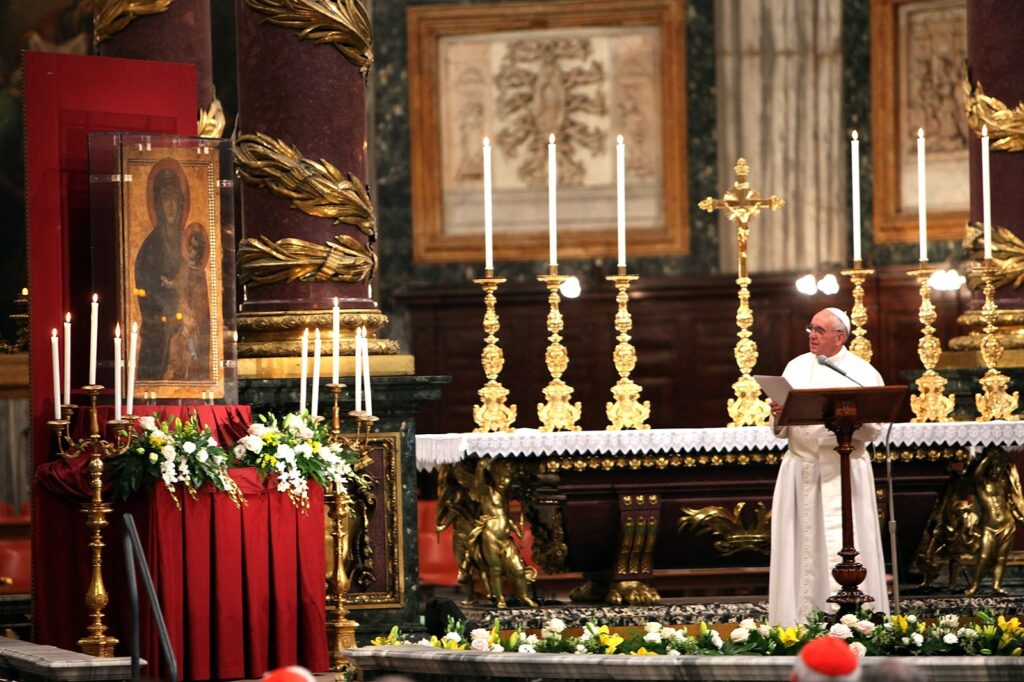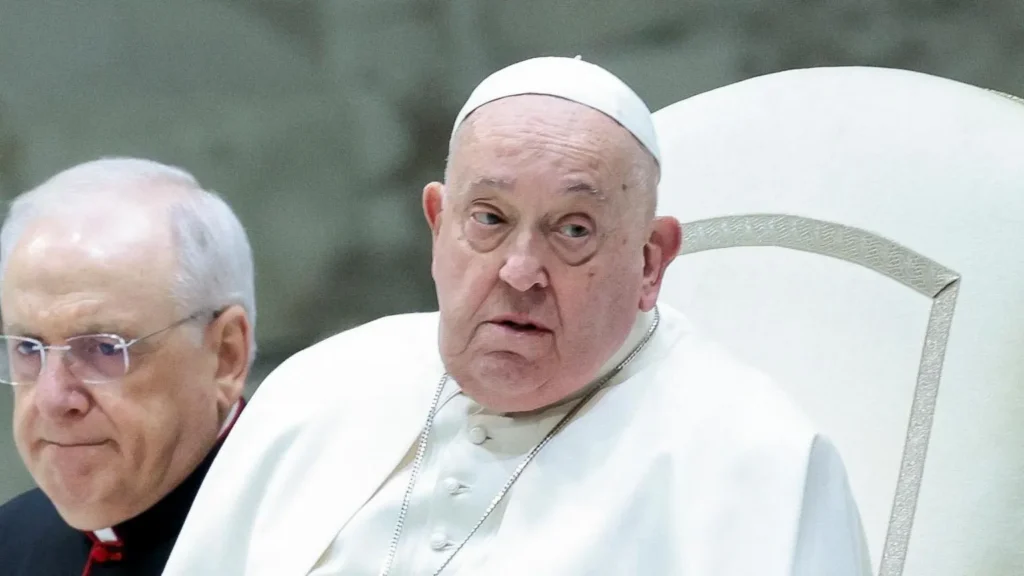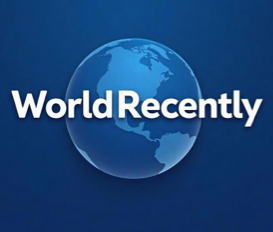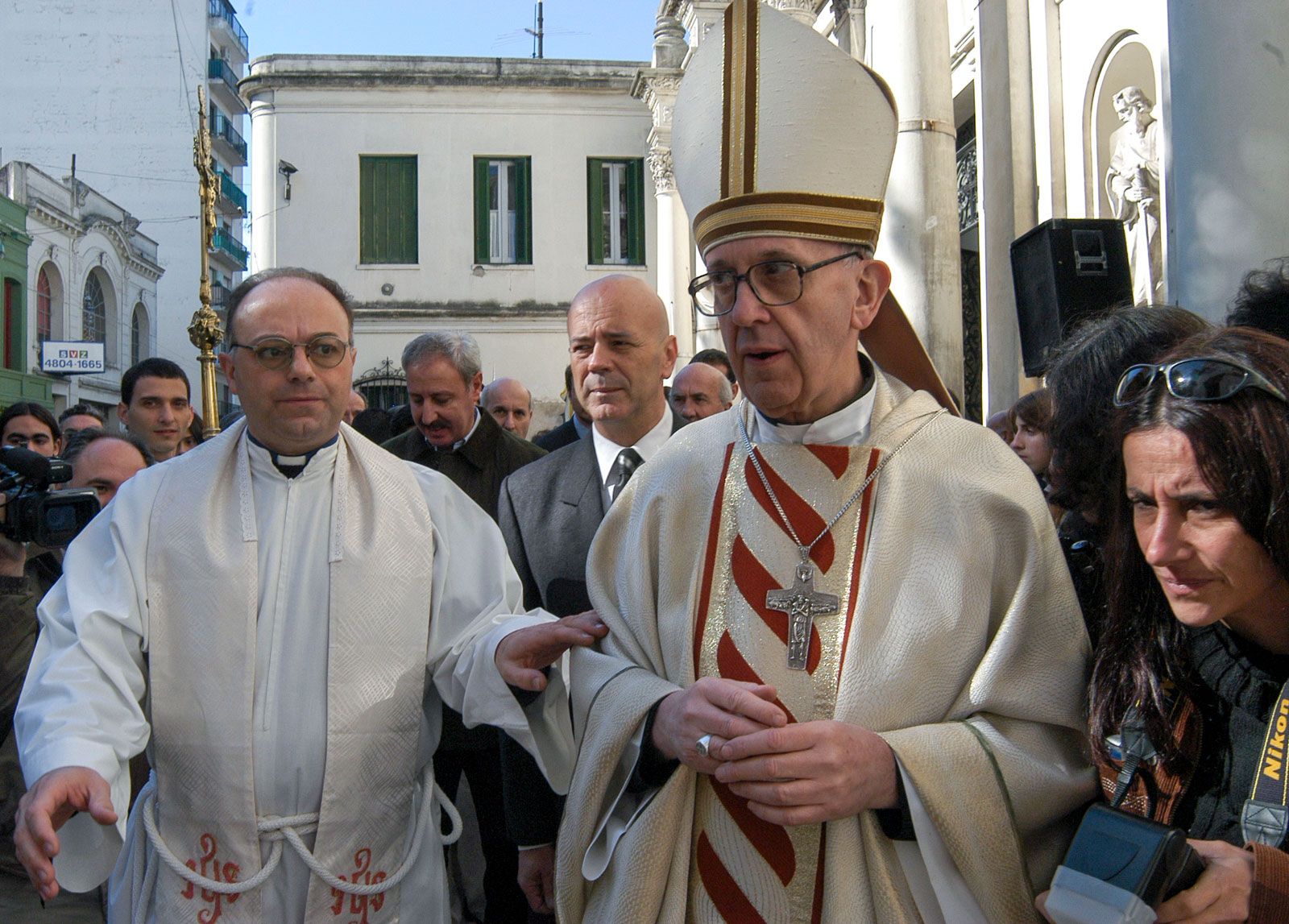Key Points
- Pope Francis, born Jorge Mario Bergoglio on December 17, 1936, in Buenos Aires, Argentina, is the current Pope and the first from Latin America and the Jesuit order.
- He grew up in a working-class family, studied chemistry, and joined the Jesuits in 1958, becoming a priest in 1969.
- His role during Argentina’s dictatorship (1976-1983) is debated, with accusations of involvement in kidnappings dismissed, and evidence suggesting he helped protect people.
- Elected Pope on March 13, 2013, he is known for humility, social justice advocacy, and environmental focus, notably through the 2015 encyclical Laudato Si’.
Early Life and Education
Pope Francis, born Jorge Mario Bergoglio, grew up in the working-class neighborhood of Barrio de Flores, Buenos Aires. His parents, Italian immigrants Mario Bergoglio and Regina Maria Sívori, raised him with a strong sense of community. After studying chemistry and earning a technical certification, he felt a calling to the priesthood, joining the Jesuit order in 1958 and being ordained in 1969.
Career and Papacy
Bergoglio rose through the Church ranks, serving as a professor, spiritual director, and Provincial Superior of Argentina from 1973 to 1979. Appointed Archbishop of Buenos Aires in 1998, he was elected Pope in 2013, choosing the name Francis to honor St. Francis of Assisi. His papacy emphasizes humility, living simply, and addressing global issues like poverty and climate change.
Unexpected Detail: Environmental Advocacy
An unexpected aspect of his leadership is his strong environmental advocacy, highlighted by Laudato Si’, which calls for action on climate change, reflecting his broader social justice mission.
Survey Note: Comprehensive Analysis of Pope Francis’s Life and Legacy
This note provides a detailed examination of Pope Francis’s life, career, and impact, expanding on the key points for a thorough understanding. The information is drawn from reliable sources, ensuring accuracy and depth for readers interested in his biography.
Background and Early Life
Pope Francis, born Jorge Mario Bergoglio on December 17, 1936, in Buenos Aires, Argentina, hails from a working-class family. His father, Mario Bergoglio, was a railway worker, and his mother, Regina Maria Sívori, was a homemaker, both of Italian descent. Growing up in Barrio de Flores, he was one of five children, experiencing the challenges and values of a tight-knit community. This background shaped his later emphasis on social justice and empathy for the marginalized.
His early education included public schools, where he obtained a technical certification as a chemist. However, a strong calling to the priesthood led him to join the Society of Jesuits in 1958 at age 22. His theological studies spanned institutions like the University of Buenos Aires and the Pontifical Gregorian University in Rome, culminating in his ordination as a priest on December 13, 1969.
Career Progression and Role During the Argentine Dictatorship
Bergoglio’s career within the Church saw rapid advancement. In 1973, he made his perpetual vows in the Jesuits and was elected Provincial Superior for Argentina, a role he held until 1979. This period coincided with Argentina’s dictatorship (1976-1983), known as the “Dirty War,” a time of political repression and human rights abuses.

His role during this era has been a subject of controversy. Accusations surfaced, notably in 2005, when human rights lawyer Myriam Bregman filed a criminal complaint alleging his involvement in the kidnapping of two Jesuit priests, Orlando Yorio and Franz Jalics, in 1976. The priests were tortured but found alive five months later. Yorio accused Bergoglio of not helping, while Jalics later clarified that Bergoglio was not responsible, stating, “It is wrong to assert that our capture took place at the initiative of Father Bergoglio” (Wikipedia). Bergoglio told his biographer Sergio Rubin that he worked behind the scenes for their release, possibly saving their lives by interceding with dictator Jorge Rafael Videla, and sheltered people on church property, even giving his identity papers to a man to flee (Wikipedia).
Supporting accounts include Alicia Oliveira, a former Argentine judge, describing Bergoglio as “anguished” and “very critical of the dictatorship,” urging him to speak out, though he felt constrained (Wikipedia). Adolfo Pérez Esquivel, a Nobel Peace Prize laureate, stated Bergoglio “never collaborated with the dictatorship” and was “no accomplice” (Wikipedia). Historian Uki Goñi noted that early in 1976, the junta had a good public image, and the scale of repression was not widely known, suggesting Bergoglio had little reason to suspect fatal outcomes (Wikipedia). In 2000, as head of the Argentine bishops’ conference, he issued a collective apology for the Church’s failure to protect people during the Dirty War, indicating his critical stance (Wikipedia).
Rise to Episcopate and Papal Election
In 1992, Bergoglio was consecrated an auxiliary bishop of Buenos Aires, becoming coadjutor bishop in 1997 and succeeding as Archbishop in 1998. His leadership was marked by humility, traveling by bus, and living in an apartment, reflecting his statement, “My people are poor and I am one of them” (Official Vaticana Website). He advised priests to show mercy and keep doors open, criticizing “spiritual worldliness” as self-centeredness (Official Vaticana Website).
On March 13, 2013, following Pope Benedict XVI’s resignation, Bergoglio was elected Pope by a conclave of 115 cardinals, taking the name Francis to honor St. Francis of Assisi, symbolizing poverty and care for creation (USCCB). His election was historic, making him the first from the Americas, the first Jesuit, and the first non-European Pope in over a millennium (Britannica). His inaugural Mass on March 19, 2013, drew tens of thousands, where he pledged to protect the Church and creation, echoing St. Joseph’s role (BeMyDisciples).
Papacy and Key Contributions
Francis’s papacy has been characterized by a simpler, less formal approach, living in the Vatican guesthouse and focusing on reform. Key contributions include:
- Humility and Lifestyle: He rejected the papal palace, opting for a modest apartment, and is known for cooking his own meals, reflecting his Jesuit vow to avoid ecclesiastical honors (BBC News).
- Social Justice: He has criticized the “globalization of indifference,” advocating for the impoverished, migrants, and refugees. His 2013 visit to Lampedusa highlighted the plight of undocumented African migrants (Catholic News Agency).
- Environmental Stewardship: The 2015 encyclical Laudato Si’ addressed climate change, urging global action to protect the environment, aligning with his social justice mission (Britannica).
- Interfaith Dialogue: He has promoted unity between Catholics, non-Catholics, and non-Christians, emphasizing dialogue to build bridges (Britannica).
- Church Reform: He has apologized to survivors of clergy sexual abuse and initiated reforms for transparency, addressing long-standing issues within the Church (Britannica).
His views have been tested in Argentina, the first Latin American country to legalize same-sex marriage, where he navigated tensions with progressive policies while maintaining a strong Argentine patriot identity, as seen in his 2016 Mass for Falklands War veterans (BBC News).
Health and Current Context
As of February 27, 2025, Pope Francis, now 88, has faced health challenges, including hospitalization in February 2025 for bronchitis, which developed into pneumonia and mild kidney failure, treated with blood transfusions and supplemental oxygen (Biography.com). Despite these issues, he remains alert and continues his duties, reflecting his resilience.

Comparative Analysis Table
To illustrate his unique position, consider the following comparison:
| Aspect | Pope Francis | Previous Popes (e.g., Benedict XVI) |
|---|---|---|
| Origin | Latin America (Argentina) | Europe (Germany) |
| Order | Jesuit | Benedictine |
| Election Year | 2013 | 2005 |
| Focus Areas | Social justice, environment | Theological doctrine, tradition |
| Living Style | Modest, apartment | Traditional, papal palace |
This table highlights his distinct approach, emphasizing accessibility and modernity.
Conclusion
Pope Francis’s journey from a working-class Argentine family to the papacy exemplifies his commitment to humility, service, and reform. His papacy has reshaped the Church’s global image, focusing on social and environmental issues, making him a pivotal figure in contemporary Catholicism. His legacy continues to evolve, particularly in addressing global challenges and fostering dialogue.
Key Citations
- Pope Francis – Wikipedia detailed biography
- Francis | Biography, Pope, Laudato Si’, Roman Catholic Church, & Facts | Britannica
- Biography | Francis – Official Vaticana detailed life story
- The Life and Ministry of Pope Francis | USCCB official events
- Profile: Pope Francis – BBC News comprehensive overview
- Biography of Pope Francis | BeMyDisciples early life and papacy
- Pope Francis | Biography – Catholic News Agency key contributions
- Pope Francis Remains in Critical Condition with Pneumonia and Kidney Failure – Biography.com recent health
-

Disney’s Live-Action Snow White Controversy Fully Explained: a Classic vs. Modern Tug-of-War
-
Tips and personal experience in buying auto insurance
-
Car Accident Guide: Handling Procedures, Insurance Claims & Legal Rights Explained
-
7 Key Reasons to Buy Life Insurance


